March 27, 2024
Trailblazers of diversity: Voices of women advocating for equity – Part 1
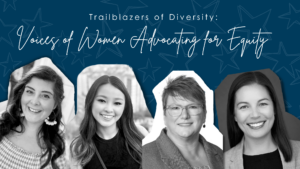 As we celebrate Women’s History Month, we shine a spotlight on the remarkable women within our organization who are not only excelling in their professional roles but are also trailblazing advocates for equity, diversity, and inclusion. In this first part of the series, we explore their intersectionality in advocacy, leadership and allyship, and impactful moments.
As we celebrate Women’s History Month, we shine a spotlight on the remarkable women within our organization who are not only excelling in their professional roles but are also trailblazing advocates for equity, diversity, and inclusion. In this first part of the series, we explore their intersectionality in advocacy, leadership and allyship, and impactful moments.
From an Asian-American implementations manager breaking barriers to a Vice President of Revenue Cycle embracing diverse perspectives, each individual in our interviews embodies the spirit of advocacy for equity. Their experiences as mothers, leaders, and professionals add layers to the narrative, showcasing the intersections of gender, culture, and career. As we delve into their stories, a common thread emerges — a commitment to fostering a workplace where everyone’s voice is heard and valued.

Intersectionality in Advocacy:
How do you navigate and celebrate the intersectionality of your identity while advocating for equity and inclusion in the workplace?
Anni: I was raised by two full-time working parents; however, they still both played very stereotypical gender roles in our home. My parents are Boomers (I’m Gen X), and my mom was the first in her family to go to college. She felt like she had two options – to become a teacher or a nurse; she became a teacher. At a very early age, I remember my mom talking to me about the importance of having a career and telling me I could be anything I wanted – this seems to be a critical theme that shaped many women of my generation. She was adamant about women having the ability to make their own money and support themselves and having something that defined them outside of being a mom. I think this advice drilled into my head, coupled with watching my dad chart his course as a successful business owner, shaped my work ethic and ultimately gave me the confidence to pursue my career goals.
May: Self-awareness and reflection are crucial in understanding my identity while advocating for others in the workplace. As I have evolved in my career as a woman, I have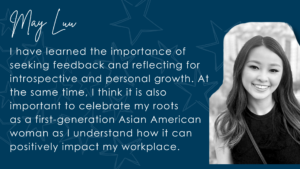 grown, I have learned the importance of seeking feedback and reflecting for introspective and personal growth. At the same time, I think it is also important to celebrate my roots as a first-generation Asian American woman as I understand how it can positively impact my workplace.
grown, I have learned the importance of seeking feedback and reflecting for introspective and personal growth. At the same time, I think it is also important to celebrate my roots as a first-generation Asian American woman as I understand how it can positively impact my workplace.
Robyn: As the youngest “Boomer” and oldest “Gen X’er,” this has been my journey over my thirty-year career. My first experience with diversity was attending school in the early days of desegregation. I hadn’t known segregation and didn’t know why my friends of color lived in different neighborhoods and had to ride the bus to school. As a woman, I entered a field dominated mainly by men as physicians yet supported by almost entirely female teams (nurses, office staff, etc.). And as a later-in-life queer person, I couldn’t understand the challenges due to my “straight” position of privilege in the workplace while still facing hurdles due to my gender.
Because of my journey, I have been primarily involved in advocacy by joining a Tribal Health Organization working with Alaskan Natives, which provided me with the foundation to speak to advocacy issues in all aspects of my life. Having a desire to understand bias and how we all have it is the first step forward. Seeking to understand, being self-aware, and having a natural curiosity about how to talk about complex subjects is how I try to “live out advocacy” because it is a journey. It’s a journey for oneself and all those with whom you interact. Some are walking the path with you, some from behind, and some ahead, but hopefully, they are heading to the same destination.
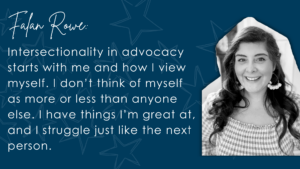 Falan: I come from a background where seeing your personal value wasn’t inherent. So, I’d say that intersectionality in advocacy starts with me and how I view myself. I don’t think of myself as more or less than anyone else. I have things I’m great at, and I struggle just like the next person.
Falan: I come from a background where seeing your personal value wasn’t inherent. So, I’d say that intersectionality in advocacy starts with me and how I view myself. I don’t think of myself as more or less than anyone else. I have things I’m great at, and I struggle just like the next person.
Leadership and Allyship:
As a leader (or in your leadership role), how do you actively ally with underrepresented groups to ensure their voices are heard and valued?
Anni: As a white woman, I recognize my privilege and actively engage in allyship. I am a dedicated member of Sound’s Women of Sound (WoS) affinity group, which serves as a platform for advocacy, education, and networking within Sound. I took the initiative to establish an offshoot of the WoS affinity group, initially named Mothers of Sound and later expanded to Parents of Sound, to ensure inclusivity and provide a space for all parents to share their experiences.
May: In my leadership role, I am actively allying with underrepresented groups by giving them a safe space to openly talk and share their ideas. As a woman leader, I know how difficult it can be to speak up and share ideas in the room, so when I manage projects or work with different teams/stakeholders, I always try to create an inclusive space to actively seek out and encourage contributions from the team members with diverse backgrounds, experiences, and viewpoints. I hope to empower and support women of all backgrounds to feel comfortable sharing their ideas and perspectives and collaborate.
Robyn: When I joined Sound, I was inspired by its commitment to DEI. I realized that actual change requires active allyship. I strive to be authentic in all my interactions, openly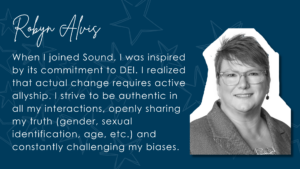 sharing my truth (gender, sexual identification, age, etc.) and constantly challenging my biases. My aim is to foster allyship by being an active member of my affinity group and community, and this personal commitment is crucial for promoting diversity and inclusion. The best thing I can do as a leader is to create forums and safe spaces for discussion and questions (allies have many!) and try to provide guidance and answers or direct me to a better resource if I cannot be it.
sharing my truth (gender, sexual identification, age, etc.) and constantly challenging my biases. My aim is to foster allyship by being an active member of my affinity group and community, and this personal commitment is crucial for promoting diversity and inclusion. The best thing I can do as a leader is to create forums and safe spaces for discussion and questions (allies have many!) and try to provide guidance and answers or direct me to a better resource if I cannot be it.
Falan: Treating everyone with equal value is a crucial step here. We have a saying during the go-live week in implementations taught me by Jenn Grover: We drop titles at the door. The sentiment is that we all have a job to do to support the success of our programs. That principle can be applied to most work and life scenarios.
Impactful Moments:
Can you recall a particular moment or initiative where your advocacy efforts made a notable impact on the workplace culture or the experiences of your colleagues?
Anni: Covid will forever be seared into all of our memories. However, it is especially poignant in helping me define how I now show up as a working mom. When the world shut down, I had a kindergartner, 3rd grader, and 5th grader. I was trying to balance my new normal – working from home full time, homeschooling three kids, and managing the stress on our family related to my husband’s job as a first responder.
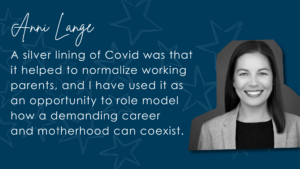 Since having kids, I have been sensitive to being seen as less committed or driven. COVID-19 made my other job as “mom” much more visible to my team and employer overnight. A silver lining of Covid was that it helped to normalize working parents, and I have used it as an opportunity to role model how a demanding career and motherhood can coexist.
Since having kids, I have been sensitive to being seen as less committed or driven. COVID-19 made my other job as “mom” much more visible to my team and employer overnight. A silver lining of Covid was that it helped to normalize working parents, and I have used it as an opportunity to role model how a demanding career and motherhood can coexist.
Robyn: Anyone who is mindful of and appreciates diversity’s importance will find impactful moments each day. They aren’t groundbreaking in general but are profound in their intimacy. My awareness of implicit bias has improved my relationships because it gives me the perspective of questioning actions and behaviors in a way I hadn’t before. I have greater empathy and a greater desire to understand first by listening. The mistakes I’ve made along the way have been a blessing as I seek to understand more and continue to do better.
